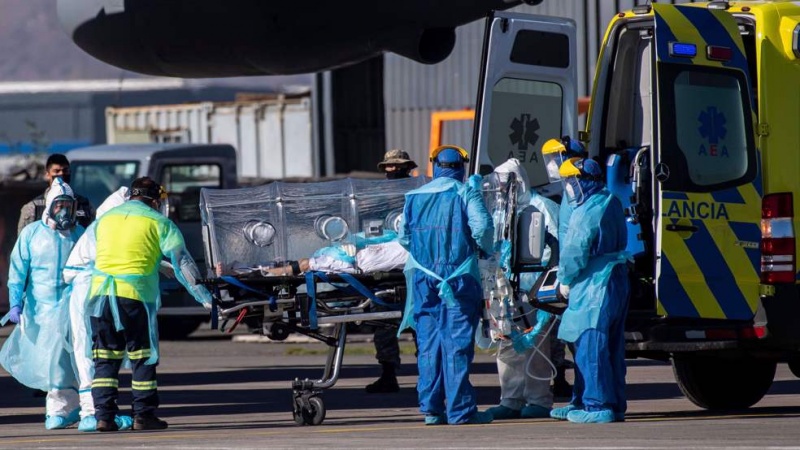More than 5.4 million infected, over 345k dead
The number of known coronavirus cases across the world has risen to 5,410,439, while 345,105 have lost their lives to the disease (COVID-19), about five months after the deadly virus emerged in China and quickly moved to plague other countries.
Many countries have reported a fall in the number of infections, relaxing the lockdown restrictions they imposed on their cities to contain the fast-spreading virus.
The easing of the social-distancing measures have led to a commuter surge in big cities. Meanwhile, changing recommendations from scientists and health authorities on subjects such as whether it is necessary to wear face masks has confused the public, prompting many to refuse wearing masks in public.
The situation has sparked concerns among health experts that such a situation could hinder global efforts to slow down the spread.
The following are the latest on the coronavirus pandemic around the globe:
Australia opens schools in most populous state
Australia has deployed hundreds of crowd control staff to its most populous state, New South Wales (NSW), to enforce social-distancing guidelines on public transport, as schools and businesses reopened there.
In NSW, which includes the city of Sydney, children returned to schools on Monday and many were allowed to return to offices.
Australia has reported over 7,100 cases of the viral infection, including 102 deaths, well below figures reported by other developed countries.
Health officials have recently been reporting fewer than 20 new cases on a daily basis.
Japan to lift state of emergency for Tokyo
Japan is set to lift a state of emergency for the capital Tokyo and other remaining areas.
Japan’s economy minister told reporters on Monday that the government had received approval from key advisers to remove the state of emergency for all remaining regions.
“While the emergency state will be lifted, it is important to expand economic activity in stages as we establish a new way of living,” Yasutoshi Nishimura said.
Governor Yuriko Koike also said Tokyo plans to reopen libraries and museums and allow restaurants to open for longer with the state of emergency lifted
Theaters, cinemas and other venues would reopen at a later stage, she added
Meanwhile, the Japanese government is considering a plan to allocate $930 billion in fresh stimulus to help the country’s stricken economy and get the firms through the pandemic.
Japan has recorded 16,580 COVID-19 cases and 830 deaths, according to the Health Ministry data.
China reports 11 new cases
China — where the virus first showed up in late 2019 — registered 11 other new cases of infection as of end of Sunday, all of which were brought in from abroad.
The National Health Commission said 10 of the new cases were in Inner Mongolia region and one in the southwestern province of Sichuan.
The total number of cases to date stands at 82,985 and the death toll remains unchanged at 4,634.
South Korea reports 16 cases
South Korea also recorded 16 new COVID-19 cases as two million more children will be returning to school this week.
Most of the new cases came from the densely-populated Seoul metropolitan area, where more than 200 infections have been linked to entertainment facilities since early May.
The country has had 11,206 cases and 267 deaths.
India resumes flights despite record rise in daily cases
Elsewhere in Asia, India resumed domestic flights after two months on Monday under a plan to ease the virus-related restrictions, though the number of new cases there rose by a record 24-hour amount on Sunday.
The Health Ministry reported 6,767 new cases, taking the total to 138,845. It also reported a total of 4,021 deaths nationwide.
Airlines are prepared to resume about a third of their domestic flight operations, while officials have offered no clarity over what quarantine rules may be applied to passengers.
US bans arrivals from Brazil
In the America continent, Washington banned all non-citizen arrivals from Brazil, the second COVID-19 hotspot after the US.
Brazil, which confirmed its first case in late February, now has a total number of 363,211 confirmed cases and more than 22,000 deaths.
On Sunday, the officials registered 653 additional deaths and 15,813 new cases.
When the world began taking drastic precautionary measures to contain the pandemic in February and March, Brazil’s far-right President Jair Bolsonaro played down the epidemic as “the little flu” and encouraged public gatherings.
Bolsonaro — called the South American version of US President Donald Trump — is said to be guided by Trump’s theories about the new coronavirus.
‘One million Mexicans could lose jobs’
In Mexico, President Andres Manuel Lopez Obrador said the pandemic could cost up to one million jobs, but promised that the government would work to create two million new jobs.
The country’s economy had already been in recession before the pandemic struck.
Lopez Obrador’s government has repeatedly claimed that it has the virus outbreak under control, but has registered 65,856 cases and 7,179 deaths so far.
‘Chile’s health system under strain’
Chilean President Sebastian Pinera warned on Sunday that the health system is “very close to the limit,” as the number of known cases of COVID-19 approaches 70,000 across the South American state.
The Ministry of Health reported 3,709 new cases over the last 24 hours, bringing the total to 69,102. The death toll is at 718.
A third of Chile’s population of about 19 million is currently under mandatory quarantine.
Germany reports 289 new cases
Many governments across Europe continue to ease lockdown restrictions as the continent’s summer vacation season approaches, with a rise expected in outdoors activities.
Health experts, however, warned that this could prompt a second wave of the pandemic in the continent.
In Germany, the number of confirmed cases of COVID-19 has increased by 289 to 178,570, data from the Robert Koch Institute (RKI) for infectious diseases showed on Monday.
The reported death toll rose also by 10 to 8,257, the data showed.
SS



